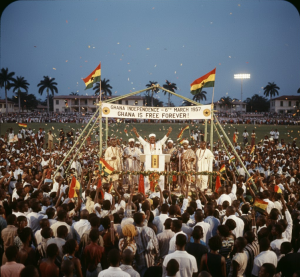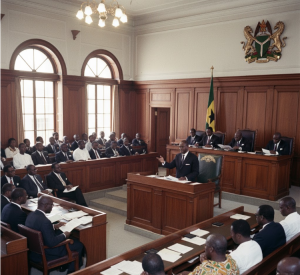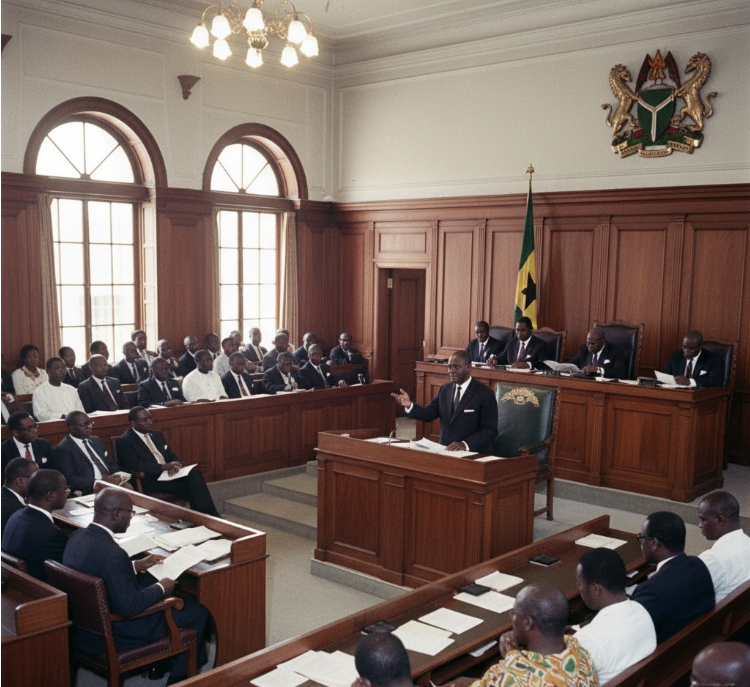Standing at Black Star Square on March 6, 1957, watching Ghana become the first sub-Saharan African nation to gain independence, my grandfather couldn’t have imagined the turbulent democratic journey ahead. From the euphoria of Kwame Nkrumah’s leadership to the pain of military coups, from one-party authoritarianism to the stable democracy we cherish today, the evolution of democracy in Ghana since independence reads like a political thriller with real-life consequences for millions.
Here’s what makes Ghana’s democratic journey so significant: in the 68 years since independence, Ghana has been a republic for only about 42 years, experiencing four republics, with the first three being interrupted by military dictatorships. Yet today, Ghana stands as one of only two West African countries classified as “free” by Freedom House, having successfully conducted multiple peaceful transfers of power since 1992.
Whether you’re a student studying African politics, a citizen wanting to understand how we got here, or someone interested in democratic transitions, understanding the evolution of democracy in Ghana since independence offers crucial lessons about resilience, the fragility of democratic institutions, and the power of learning from past mistakes.

The Dawn of Independence and First Republic (1957-1966)
From Colony to Nation
Modern Ghana, formerly known as the Gold Coast, was the first country in Sub-Saharan Africa to gain political independence from colonial rule in 1957. Following years of British rule from the early 19th century to the mid-20th century, a new legislative assembly elected in 1956 passed a resolution requesting independence, which was granted on March 6, 1957.
Under the Constitution promulgated for the new nation in 1957, a Westminster system of government was established with the prime minister as head of cabinet and the British Monarch as the head of state. Kwame Nkrumah became Prime Minister, leading Ghana into a new era with tremendous optimism and pan-African ambitions.
The Shift to Authoritarianism
On July 1, 1960, Ghana transformed from a constitutional monarchy to a republic, with Nkrumah becoming the first President. The government of Kwame Nkrumah won the approval of a constitutional referendum in 1964, that made Ghana a One-party state and him, president for life.
This shift from democracy to authoritarianism happened gradually. The Preventive Detention Act, approved by the National Assembly in 1958, allowed detention without trial. By 1964, the Convention People’s Party (CPP) was recognized as the only political party in the country, ending Ghana’s brief experiment with competitive democracy.
While Nkrumah championed African liberation and pan-Africanism abroad, internally Ghana became increasingly authoritarian. Deep resentment and internal opposition to the Nkrumah regime built up, setting the stage for what would become a pattern of military interventions.
The First Coup
The Nkrumah government was deposed in a Coup initiated by the National Liberation Council on February 24, 1966. Lieutenant-General Joseph Arthur Ankrah led the National Liberation Council (NLC) that overthrew Nkrumah while he was on a state visit to China. The First Republic lasted just 5 years and 240 days.
This coup established a dangerous precedent: when civilian government faced challenges, the military felt justified intervening. It would take decades to break this cycle.
The Second Republic (1969-1972): Brief Democratic Revival
Ghana became a Republic once more on 1 October 1969 when the National Liberation Council handed power over to civilian rule. A new constitution was drafted based on the parliamentary system of government in the United Kingdom.
The NLC lifted the ban on political activities in May 1969 and fixed a date for general elections. Five political parties participated in the August 29 elections, with the Progress Party, led by K.A. Busia, winning a sizeable majority: 105 of 140 seats.
The 1969 constitution provided for a judiciary, a unicameral legislature, a prime minister, and a president. It introduced a parliamentary system similar to the United Kingdom’s, with the president as ceremonial head of state and the prime minister as head of government.
Another Military Intervention
The Second Republic lasted only three years. Prime Minister Busia and the 3rd president of the 2nd Republic, Edward Akufo-Addo, were removed by General Ignatius Kutu Acheampong, the head of the National Redemption Council (NRC), in a military coup on January 13, 1972.
General Acheampong ruled Ghana for 6 years and 173 days, first as chairman of the NRC and later as chairman of the Supreme Military Council (SMC). His regime faced economic difficulties and corruption allegations, eventually losing legitimacy.
The Turbulent Years (1972-1981): Military Dominance
Between 1972 and 1979, Ghana fell under the rule of several military dictators. This period saw palace coups, counter-coups, and growing public frustration with military mismanagement.
The Rawlings Revolution (1979)
In 1979, a young Flight Lieutenant named Jerry John Rawlings led an uprising that changed Ghana’s trajectory. Lieutenant General Akuffo was removed by Flight Lieutenant Jerry John Rawlings, the chairman of the Armed Forces Revolutionary Council (AFRC), in a coup on June 4, 1979.
The AFRC executed eight senior military officers, including former heads of state Acheampong and Akuffo, in what it called a “house cleaning” exercise. Despite the violence, the AFRC accepted a draft constitution that had been prepared, permitted scheduled presidential and parliamentary elections to proceed, and handed over power to the elected Third Republic government on September 24, 1979.
The Third Republic (1979-1981): Shortest Democratic Experiment
Rawlings ushered Ghana into its 3rd Republic with a democratic election. Dr. Hilla Limann, who was the flagbearer of the People’s National Convention (PNC), won the elections and was President of Ghana for 2 years and 98 days, from September 24, 1979, to December 31, 1981.
The 1979 constitution was modeled on Western democracies, providing for separation of powers among an elected president, a unicameral parliament, and an independent judiciary. However, economic problems persisted, and on December 31, 1981, Dr. Limann was removed by Rawlings on December 31, 1981. Rawlings, the chairman of the Provisional National Defence Council (PNDC), ruled Ghana for 11 years and 7 days.
The PNDC Era (1981-1992): From Revolution to Democracy
The PNDC period represented Ghana’s longest spell under military rule, but paradoxically, it laid the groundwork for Ghana’s most successful democratic experiment.
Economic Reforms and Political Pressure
The PNDC implemented the Economic Recovery Program (ERP) in 1983, an austere program that stabilized Ghana’s economy but came with significant social costs. Despite economic improvements, domestic and international pressure for democratic governance intensified.
In 1984, the PNDC created a National Commission on Democracy to study ways to establish participatory democracy in Ghana. District-level elections were held in 1988 and 1989 for newly created district assemblies, testing local democratic structures.
The Road to the Fourth Republic
In line with its vision of fully restoring the country to a democratic system of governance and spurred by similar democratic trends across the region in the 1990s, the PNDC authorized the NDC to embark on a public consultation process designed to collect, analyze and collate Ghanaians’ views on the form of state they desired.
This process led to the appointment of an inclusive 258-member Committee of Experts to draw up constitutional proposals. The Assembly prepared a draft constitution based on proposals submitted to it by the PNDC, as well as previous constitutions of 1957, 1969 and 1979, and the report of the Committee of Experts. The final draft constitution was unanimously approved by the people in a referendum on 28 April 1992, with 92% approval.
The Fourth Republic (1993-Present): Democratic Consolidation
The Constitution that established the Fourth Republic provided a basic charter for republican democratic government. It declares Ghana to be a unitary republic with sovereignty residing in the Ghanaian people. Intended to prevent future coups, dictatorial government, and one-party states, it is designed to establish the concept of power-sharing.
Key Constitutional Safeguards
The 1992 Constitution incorporated lessons from Ghana’s painful history:
- Clear separation of powers among Executive, Legislature, and Judiciary
- Presidential term limits (maximum two four-year terms)
- Independent Electoral Commission
- Strong judicial review powers
- Protection of fundamental human rights
- Checks and balances to prevent concentration of power
The First Peaceful Transfer (2000)
Ghana’s democracy faced its first major test in 2000. After Jerry Rawlings served two elected terms (1993-2001), presidential elections were held. John Agyekum Kufuor of the New Patriotic Party (NPP) defeated John Atta Mills of the ruling National Democratic Congress (NDC) in a runoff election.
This peaceful transfer of power from one party to another was historic. It demonstrated that Ghana’s democratic institutions could survive political competition and that losing parties would respect electoral outcomes.
Consolidating Democracy
Since 2000, Ghana has experienced multiple peaceful transfers of power:
- 2008: John Atta Mills (NDC) defeated Nana Akufo-Addo (NPP)
- 2012: John Dramani Mahama (NDC) defeated Nana Akufo-Addo (NPP)
- 2016: Nana Akufo-Addo (NPP) defeated John Mahama (NDC)
- 2020: Nana Akufo-Addo (NPP) re-elected over John Mahama (NDC)
- 2024: John Mahama (NDC) defeated Mahamudu Bawumia (NPP)
Each transition reinforced democratic norms and institutional strength.
Ghana’s Democratic Timeline
| Period | Government Type | Key Leader | Duration |
|---|---|---|---|
| 1957-1960 | Constitutional Monarchy | PM Kwame Nkrumah | 3 years |
| 1960-1966 | First Republic | President Nkrumah | 6 years |
| 1966-1969 | Military (NLC) | Gen. Ankrah/Afrifa | 3+ years |
| 1969-1972 | Second Republic | PM Busia | 3 years |
| 1972-1979 | Military (NRC/SMC) | Gen. Acheampong/Akuffo | 7 years |
| 1979 | Military (AFRC) | Flt. Lt. Rawlings | 112 days |
| 1979-1981 | Third Republic | President Limann | 2 years |
| 1981-1992 | Military (PNDC) | Rawlings | 11 years |
| 1993-Present | Fourth Republic | Democratic elections | 32+ years |
Key Democratic Achievements
Peaceful Power Transfers: Ghana has successfully conducted multiple elections with losing parties accepting results and peacefully transitioning power.
Independent Institutions: The Electoral Commission, judiciary, and other constitutional bodies function with significant independence.
Media Freedom: Ghana enjoys relatively robust press freedom compared to many African nations.
Civil Society: Active civil society organizations hold government accountable and advocate for citizens’ interests.
Legal Dispute Resolution: Electoral disputes are resolved through courts rather than violence, as seen in the 2012 and 2020 presidential election petitions.
Persistent Challenges
Corruption: Despite progress, corruption remains a significant challenge affecting public confidence in democratic institutions.
Economic Pressures: Economic difficulties, including recent debt crises, test democratic resilience and public patience.
Ethnic and Regional Divisions: While Ghana has avoided major ethnic conflicts, regional and ethnic considerations continue influencing political behavior.
Vigilantism: Political party vigilante groups have occasionally threatened democratic norms, though efforts to address this continue.
Democratic Backsliding Concerns: Recent judicial independence concerns and executive overreach allegations require vigilance.
What Makes Ghana’s Democracy Work
Constitutional Learning: The 1992 Constitution incorporated lessons from previous failures, creating robust institutional safeguards.
Strong Institutions: Independent Electoral Commission, Supreme Court, and other bodies provide checks on power.
Two-Party System: While limiting diversity, the NDC-NPP duopoly has created predictable competition and alternation.
Regional Stability Role: Ghana’s democratic success influences neighbors and raises the cost of democratic failure.
Civil Society Engagement: Active media, NGOs, and citizen movements hold leaders accountable.
Peaceful Culture: Ghanaians generally prefer democratic resolution over violence.
Lessons for Africa and Beyond
Ghana’s democratic evolution offers important lessons. Democracy isn’t linear; it requires constant work and vigilance. Military intervention doesn’t solve political problems; it creates cycles of instability. Constitutional design matters; well-crafted institutions can prevent democratic backsliding. Economic performance and democracy are interconnected but not deterministic. Regional and international support for democracy matters.
What aspect of Ghana’s democratic journey inspires you most? What do you think Ghana needs to do to strengthen democracy further? Share your thoughts in the comments, and if you found this exploration of the evolution of democracy in Ghana since independence valuable, share it with others interested in African politics and democratic transitions.
Frequently Asked Questions About Ghana’s Democracy
When did Ghana gain independence and become democratic?
Ghana gained independence from British colonial rule on March 6, 1957, becoming the first sub-Saharan African nation to do so. Initially, Ghana had a Westminster-style parliamentary democracy with Kwame Nkrumah as Prime Minister. However, Ghana became a republic in 1960 and by 1964 had transformed into a one-party authoritarian state. Ghana’s current stable democratic system, the Fourth Republic, began in 1993 following the approval of a new constitution in 1992 that established safeguards against coups and dictatorship.
How many times has Ghana had military coups?
Ghana experienced multiple military coups between 1966 and 1981, resulting in the interruption of three republics. Major coups occurred in 1966 (overthrowing Nkrumah’s First Republic), 1972 (ending Busia’s Second Republic), 1979 (Rawlings’ first coup leading to the Third Republic), and 1981 (Rawlings’ second coup ending the Third Republic). Between these major coups, there were also palace coups and counter-coups. The 1992 Constitution was specifically designed to prevent future military interventions by establishing strong institutional checks and balances.
What is Ghana’s Fourth Republic and why has it lasted so long?
The Fourth Republic began on January 7, 1993, with the promulgation of the 1992 Constitution. It has lasted over 30 years because the constitution incorporated lessons from previous failed republics, establishing clear separation of powers, presidential term limits (maximum two four-year terms), an independent Electoral Commission, strong judicial review powers, and protection of fundamental rights. The Fourth Republic has successfully conducted multiple peaceful transfers of power between the two main parties (NDC and NPP), demonstrating institutional resilience and commitment to democratic norms.
How does Ghana’s democracy compare to other African countries?
Ghana is considered one of Africa’s most stable democracies and one of only two West African countries classified as “free” by Freedom House. Ghana has successfully conducted competitive multiparty elections since 1992 and experienced peaceful transfers of power between opposition parties multiple times. While challenges like corruption and economic pressures persist, Ghana’s democratic institutions have proven resilient. The country serves as a model for democratic transitions in Africa, though it’s rated as a “flawed democracy” rather than a “full democracy” by some international assessments.
What were the main causes of Ghana’s military coups?
Ghana’s military coups stemmed from multiple factors including economic mismanagement and declining living standards, corruption and abuse of power by civilian governments, erosion of democratic institutions and one-party rule, ethnic and regional tensions, Cold War influences and external pressures, and military officers believing they could govern better than civilians. The pattern was broken by the 1992 Constitution, which created institutional safeguards, established clear rules for power transfer, protected military from political interference, and provided mechanisms for addressing grievances through democratic processes rather than coups.
Sources:
- ConstitutionNet – Constitutional History of Ghana – Comprehensive analysis of Ghana’s constitutional development and republican transitions
- Wikipedia – Political History of Ghana – Detailed chronology of Ghana’s political evolution from independence through the Fourth Republic
- U.S. State Department – Ghana Background Notes – Official historical overview of Ghana’s government and political development
